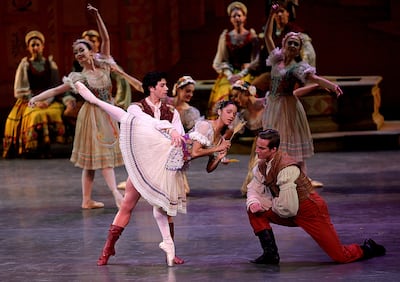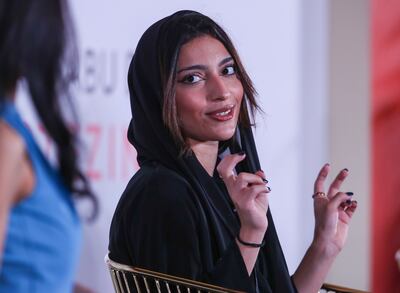“Part of the price of being the first is taking the body blows,” said Misty Copeland, the first black woman to be promoted to principal dancer at the American Ballet Theatre.
On International Women’s Day, she addressed a room full of women who also know a thing or two about being “the first”. Copeland’s talk was part of the Forbes 30/50 Summit, held in Abu Dhabi on Wednesday. Among the other speakers were two Emirati women — Zahra Lari, the first hijab-wearing figure skater and Amna Al Qubaisi, the first Emirati woman to drive race cars.
Copeland first discovered ballet at her local community centre in California when she was 13. She took a class on a basketball court, an experience, she said, that “completely changed her life”.
“To have the ballet studio become this safe haven for me, a place where I felt protected for the first time in my life,” she said. "There was a lot of abuse in my household, we didn’t often have a home, I was living in a motel when I was 13, so that space became so sacred to me. It was a place where I could express myself. I started to develop the tools that I wasn’t getting in school, not everyone thrives in that environment and works in the same way.”
In 2014, during the American Ballet Theatre’s tour to Abu Dhabi, Copeland made her debut as principal dancer in Coppelia. The following year, she made history when she became the first black woman to be promoted to principal in the company’s history.
“I understand the impact that I have by being representation, I understand what it is to have people look at me and see themselves,” she said. “That was me for so many years looking up to so many incredible black and brown women who paved the way and have not been given their due respect and their flowers. I feel like it’s my responsibility to make them proud first and foremost, but also to carry their stories and tell their stories.”
Lari is the first figure skater from the Middle East to compete internationally and the first Arab woman to compete in a hijab at an Olympic qualifier, after falling in love with the sport at the age of 12.
“I didn’t realise I was the first from the region at that time,” she said. “I was just going out there and having fun. I was very passionate about it.
“I’m all about pushing myself and doing something out of my comfort zone, and I think since I was a kid, that’s what I have been doing.”
Lari is the founder of Emirates Skating Club, the first officially registered club in the region, which she set up to help offer the training and support that was not available to her when she was starting out.
“Finding a rink here was pretty easy, finding time on that rink was a challenge,” she said. “Everyone knows hockey takes priority and us figure skaters have to be there at 4.30 in the morning. The facilities were there but the coaches were not, that’s the reason we opened up Emirates Skating Club, to make sure we could offer the best training.”
She was joined on stage by Al Qubaisi, who has taken great pleasure in breaking gender stereotypes within her sport and the region.
“I trained in gymnastics, but there was only one competition a year or so for me, it was very boring,” she said. “My dad was racing cars, so at home, everything was all about racing and I was intrigued. I wanted to be a part of that conversation so I asked if I could start karting when I was nine years old. My brothers were never interested, so my dad was confused; he was like, ‘is something wrong with the DNA, did something get switched up’.”
In 2018, Al Qubaisi became the first Middle Eastern woman to take part in a motorsport test programme for Formula E after the Diriyah ePrix in Saudi Arabia, shortly after women were legally able to drive in the country.
However, her rise has not been easy, and she has even been driven off the track a few times by men who did not like being overtaken by a woman.
“People used to use ‘drive like a girl’ as an insult, so I wanted to change that perception,” she said. “When I was karting internationally, I would beat the guys, and they would come to me and say things like ‘oh your engine is way better than ours, that’s why you’re winning’ and I’d say ‘no, no, you should just drive like a girl, that’s how to win’.”
Scroll through the gallery below for more pictures from the Forbes 30/50 Summit
Terror attacks in Paris, November 13, 2015
- At 9.16pm, three suicide attackers killed one person outside the Atade de France during a foootball match between France and Germany
- At 9.25pm, three attackers opened fire on restaurants and cafes over 20 minutes, killing 39 people
- Shortly after 9.40pm, three other attackers launched a three-hour raid on the Bataclan, in which 1,500 people had gathered to watch a rock concert. In total, 90 people were killed
- Salah Abdeslam, the only survivor of the terrorists, did not directly participate in the attacks, thought to be due to a technical glitch in his suicide vest
- He fled to Belgium and was involved in attacks on Brussels in March 2016. He is serving a life sentence in France
More on animal trafficking
CHELSEA SQUAD
Arrizabalaga, Bettinelli, Rudiger, Christensen, Silva, Chalobah, Sarr, Azpilicueta, James, Kenedy, Alonso, Jorginho, Kante, Kovacic, Saul, Barkley, Ziyech, Pulisic, Mount, Hudson-Odoi, Werner, Havertz, Lukaku.
THE DEALS
Hamilton $60m x 2 = $120m
Vettel $45m x 2 = $90m
Ricciardo $35m x 2 = $70m
Verstappen $55m x 3 = $165m
Leclerc $20m x 2 = $40m
TOTAL $485m
Our legal advisor
Ahmad El Sayed is Senior Associate at Charles Russell Speechlys, a law firm headquartered in London with offices in the UK, Europe, the Middle East and Hong Kong.
Experience: Commercial litigator who has assisted clients with overseas judgments before UAE courts. His specialties are cases related to banking, real estate, shareholder disputes, company liquidations and criminal matters as well as employment related litigation.
Education: Sagesse University, Beirut, Lebanon, in 2005.
'Fantastic Beasts: The Secrets of Dumbledore'
Rating: 3/5
Directed by: David Yates
Starring: Mads Mikkelson, Eddie Redmayne, Ezra Miller, Jude Law
Leaderboard
63 - Mike Lorenzo-Vera (FRA)
64 - Rory McIlroy (NIR)
66 - Jon Rahm (ESP)
67 - Tom Lewis (ENG), Tommy Fleetwood (ENG)
68 - Rafael Cabrera-Bello (ESP), Marcus Kinhult (SWE)
69 - Justin Rose (ENG), Thomas Detry (BEL), Francesco Molinari (ITA), Danny Willett (ENG), Li Haotong (CHN), Matthias Schwab (AUT)
If you go...
Fly from Dubai or Abu Dhabi to Chiang Mai in Thailand, via Bangkok, before taking a five-hour bus ride across the Laos border to Huay Xai. The land border crossing at Huay Xai is a well-trodden route, meaning entry is swift, though travellers should be aware of visa requirements for both countries.
Flights from Dubai start at Dh4,000 return with Emirates, while Etihad flights from Abu Dhabi start at Dh2,000. Local buses can be booked in Chiang Mai from around Dh50
Score
Third Test, Day 1
New Zealand 229-7 (90 ov)
Pakistan
New Zealand won the toss and elected to bat
'HIJRAH%3A%20IN%20THE%20FOOTSTEPS%20OF%20THE%20PROPHET'
%3Cp%3E%3Cstrong%3EEdited%20by%3A%3C%2Fstrong%3E%20Idries%20Trevathan%3Cbr%3E%3Cstrong%3EPages%3A%3C%2Fstrong%3E%20240%3Cbr%3E%3Cstrong%3EPublisher%3A%3C%2Fstrong%3E%20Hirmer%20Publishers%3Cbr%3E%3Cstrong%3EAvailable%3A%3C%2Fstrong%3E%20Now%3C%2Fp%3E%0A
Benefits of first-time home buyers' scheme
- Priority access to new homes from participating developers
- Discounts on sales price of off-plan units
- Flexible payment plans from developers
- Mortgages with better interest rates, faster approval times and reduced fees
- DLD registration fee can be paid through banks or credit cards at zero interest rates
What sanctions would be reimposed?
Under ‘snapback’, measures imposed on Iran by the UN Security Council in six resolutions would be restored, including:
- An arms embargo
- A ban on uranium enrichment and reprocessing
- A ban on launches and other activities with ballistic missiles capable of delivering nuclear weapons, as well as ballistic missile technology transfer and technical assistance
- A targeted global asset freeze and travel ban on Iranian individuals and entities
- Authorisation for countries to inspect Iran Air Cargo and Islamic Republic of Iran Shipping Lines cargoes for banned goods
French business
France has organised a delegation of leading businesses to travel to Syria. The group was led by French shipping giant CMA CGM, which struck a 30-year contract in May with the Syrian government to develop and run Latakia port. Also present were water and waste management company Suez, defence multinational Thales, and Ellipse Group, which is currently looking into rehabilitating Syrian hospitals.
The biog
Favourite food: Fish and seafood
Favourite hobby: Socialising with friends
Favourite quote: You only get out what you put in!
Favourite country to visit: Italy
Favourite film: Lock Stock and Two Smoking Barrels.
Family: We all have one!
Day 1 results:
Open Men (bonus points in brackets)
New Zealand 125 (1) beat UAE 111 (3)
India 111 (4) beat Singapore 75 (0)
South Africa 66 (2) beat Sri Lanka 57 (2)
Australia 126 (4) beat Malaysia -16 (0)
Open Women
New Zealand 64 (2) beat South Africa 57 (2)
England 69 (3) beat UAE 63 (1)
Australia 124 (4) beat UAE 23 (0)
New Zealand 74 (2) beat England 55 (2)
MATCH INFO
Euro 2020 qualifier
Ukraine 2 (Yaremchuk 06', Yarmolenko 27')
Portugal 1 (Ronaldo 72' pen)
Company profile
Name: Infinite8
Based: Dubai
Launch year: 2017
Number of employees: 90
Sector: Online gaming industry
Funding: $1.2m from a UAE angel investor
Brief scores:
QPR 0
Watford 1
Capoue 45' 1
Match info
What: Fifa Club World Cup play-off
Who: Al Ain v Team Wellington
Where: Hazza bin Zayed Stadium, Al Ain
When: Wednesday, kick off 7.30pm
ENGLAND SQUAD
Goalkeepers: Jack Butland, Jordan Pickford, Nick Pope
Defenders: John Stones, Harry Maguire, Phil Jones, Kyle Walker, Kieran Trippier, Gary Cahill, Ashley Young, Danny Rose, Trent Alexander-Arnold
Midfielders: Eric Dier, Jordan Henderson, Dele Alli, Jesse Lingard, Raheem Sterling, Ruben Loftus-Cheek, Fabian Delph
Forwards: Harry Kane, Jamie Vardy, Marcus Rashford, Danny Welbeck
Specs%3A%202024%20McLaren%20Artura%20Spider
%3Cp%3E%3Cstrong%3EEngine%3A%3C%2Fstrong%3E%203.0-litre%20twin-turbo%20V6%20and%20electric%20motor%3Cbr%3E%3Cstrong%3EMax%20power%3A%3C%2Fstrong%3E%20700hp%20at%207%2C500rpm%3Cbr%3E%3Cstrong%3EMax%20torque%3A%3C%2Fstrong%3E%20720Nm%20at%202%2C250rpm%3Cbr%3E%3Cstrong%3ETransmission%3A%3C%2Fstrong%3E%20Eight-speed%20dual-clutch%20auto%3Cbr%3E%3Cstrong%3E0-100km%2Fh%3A%3C%2Fstrong%3E%203.0sec%3Cbr%3E%3Cstrong%3ETop%20speed%3A%20%3C%2Fstrong%3E330kph%3Cbr%3E%3Cstrong%3EPrice%3A%3C%2Fstrong%3E%20From%20Dh1.14%20million%20(%24311%2C000)%3Cbr%3E%3Cstrong%3EOn%20sale%3A%3C%2Fstrong%3E%20Now%3C%2Fp%3E%0A
Ferrari 12Cilindri specs
Engine: naturally aspirated 6.5-liter V12
Power: 819hp
Torque: 678Nm at 7,250rpm
Price: From Dh1,700,000
Available: Now
MWTC
Tickets start from Dh100 for adults and are now on sale at www.ticketmaster.ae and Virgin Megastores across the UAE. Three-day and travel packages are also available at 20 per cent discount.






























